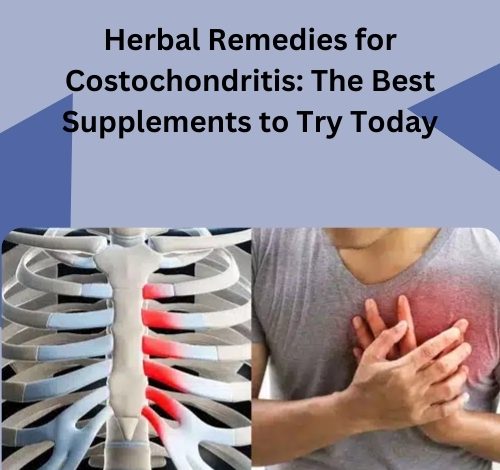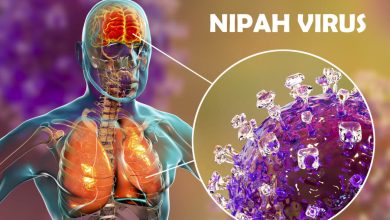Herbal Remedies for Costochondritis: The Best Supplements to Try Today
Herbal Remedies for Costochondritis

Costochondritis, a condition characterized by inflammation of the cartilage connecting the ribs to the breastbone, can cause significant chest pain and discomfort. While traditional treatments include pain relievers and anti-inflammatory medications, many individuals seek alternative approaches to manage their symptoms.
One promising avenue is the use of herbal supplements for costochondritis. These natural remedies can help reduce inflammation, alleviate pain, and support overall joint health. Some of the most effective natural remedies for costochondritis, including herbal supplements that may provide relief.
Understanding Costochondritis
Before diving into herbal remedies, it is essential to understand the symptoms and causes of costochondritis.
Symptoms of Costochondritis
- Sharp or aching pain in the chest, particularly near the breastbone
- Pain that worsens with movement, deep breathing, or coughing
- Tenderness when pressing on the affected area
- Pain that may radiate to the back or shoulders
Causes and Risk Factors
- Physical strain from heavy lifting or repetitive movements
- Trauma or injury to the chest
- Infections, particularly viral or bacterial
- Chronic inflammatory conditions such as arthritis
- Poor posture and stress-related tension
The Role of Herbal Supplements in Managing Costochondritis
Herbal supplements can provide natural anti-inflammatory, analgesic, and muscle-relaxing effects. Many herbs have been used for centuries to treat musculoskeletal pain and inflammation, making them an excellent option for individuals looking for holistic approaches to costochondritis relief.
1. Turmeric (Curcumin)
Turmeric is one of the most well-known natural anti-inflammatory agents. Curcumin, its active compound, has powerful anti-inflammatory and antioxidant properties that help reduce swelling and pain associated with costochondritis.
Benefits:
- Inhibits inflammatory pathways
- Reduces oxidative stress
- Supports joint and cartilage health
How to Use:
- Take 500-1000 mg of curcumin supplement daily
- Combine with black pepper extract (piperine) for better absorption
2. Ginger
Ginger contains bioactive compounds such as gingerol and shogaol, which have anti-inflammatory and analgesic effects.
Benefits:
- Relieves muscle pain and soreness
- Reduces inflammation in joints and connective tissues
- Improves blood circulation
How to Use:
- Take 1000-2000 mg of ginger extract daily
- Drink ginger tea or add fresh ginger to meals
3. Boswellia Serrata
Also known as Indian frankincense, Boswellia has been traditionally used to treat inflammatory conditions.
Benefits:
- Inhibits inflammatory enzymes
- Reduces pain and stiffness
- Supports cartilage regeneration
How to Use:
- Take 300-500 mg of Boswellia extract twice daily
- Use in combination with other anti-inflammatory herbs
4. Devil’s Claw
Devil’s claw is a potent herbal supplement used to treat musculoskeletal pain and inflammation.
Benefits:
- Relieves joint and muscle pain
- Acts as a natural pain reliever
- Improves mobility and flexibility
How to Use:
- Take 500-1000 mg daily
- Best taken in capsule or tincture form
5. White Willow Bark
White willow bark contains salicin, a natural compound similar to aspirin, making it an effective pain reliever.
Benefits:
- Reduces pain and inflammation
- Acts as a natural analgesic
- Supports overall musculoskeletal health
How to Use:
- Take 240 mg of white willow bark extract daily
- Brew into tea for a soothing effect
6. Arnica
Arnica is widely used for reducing pain and inflammation, particularly in muscles and joints.
Benefits:
- Speeds up healing of muscle injuries
- Reduces swelling and tenderness
- Provides topical relief when applied as a gel or cream
How to Use:
- Apply arnica gel or cream to the affected area
- Use arnica tablets under the guidance of a healthcare provider
7. Chamomile
Chamomile has anti-inflammatory and muscle-relaxing properties that can help ease costochondritis discomfort.
Benefits:
- Relieves muscle spasms
- Reduces stress-related tension
- Improves relaxation and sleep quality
How to Use:
- Drink chamomile tea daily
- Use chamomile essential oil for massage
8. Bromelain
Bromelain is an enzyme found in pineapples with strong anti-inflammatory properties.
Benefits:
- Reduces swelling and pain
- Improves circulation and tissue repair
- Enhances the effects of other anti-inflammatory herbs
How to Use:
- Take 500-1000 mg of bromelain daily
- Consume fresh pineapple for added benefits
9. Valerian Root
Valerian root is known for its calming effects on the nervous system and muscles.
Benefits:
- Relieves muscle tension
- Improves sleep and relaxation
- Reduces anxiety and stress
How to Use:
- Take 300-600 mg of valerian root extract before bedtime
- Drink valerian tea for relaxation
10. Magnesium
While not strictly an herb, magnesium is an essential mineral that plays a crucial role in muscle function and relaxation.
Benefits:
- Reduces muscle cramps and spasms
- Supports nerve function and pain relief
- Helps regulate inflammation
How to Use:
- Take 200-400 mg of magnesium daily
- Use magnesium oil topically for muscle relaxation
Additional Lifestyle Tips for Managing Costochondritis
In addition to taking herbal supplements, adopting healthy lifestyle habits can further alleviate costochondritis symptoms.
1. Gentle Stretching and Exercise
- Engage in low-impact exercises like yoga or swimming
- Perform gentle stretches to improve mobility
- Avoid activities that strain the chest area
2. Proper Posture
- Maintain an upright posture to reduce stress on the ribcage
- Use ergonomic chairs and lumbar support
3. Stress Management
- Practice deep breathing exercises
- Engage in meditation or mindfulness techniques
- Reduce anxiety to prevent tension-related chest pain
4. Heat and Cold Therapy
- Apply warm compresses to relax muscles
- Use ice packs to reduce inflammation
Conclusion
Costochondritis can be a painful and frustrating condition, but herbal supplements for costochondritis offer a natural and effective way to manage symptoms. By incorporating natural remedies for costochondritis such as turmeric, ginger, Boswellia, and other herbs, individuals can find relief and improve their overall well-being.
If you are considering herbal treatments, consult with a healthcare professional to ensure they are safe and appropriate for your specific condition. By combining natural remedies with a healthy lifestyle, you can take proactive steps toward reducing pain and inflammation caused by costochondritis.



